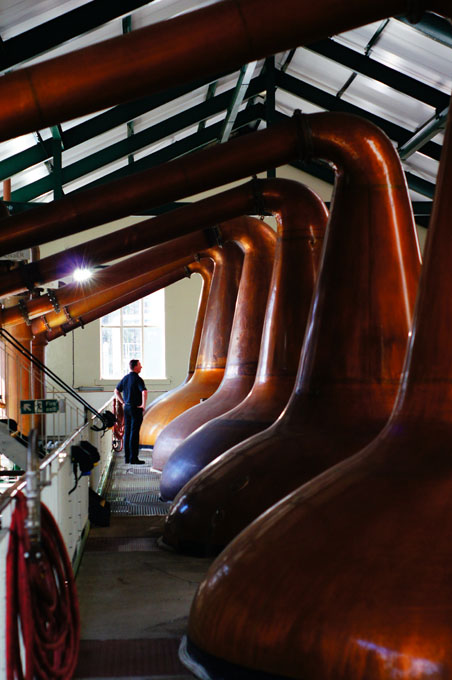
Marking World Whisky Day in the middle of last month, three revolutionists from three different sectors came together to toast to a greener future for one of Scotland’s oldest industries.
Led by London-based electrolyser development start-up Supercritical alongside partners Xodus and Beam Suntory, the trio of organisations have been working together since the start of the year on a feasibility study that explores how ‘green hydrogen’ can be used in the distillery process, ultimately resulting in a zero-emission dram.
Green hydrogen is produced by electrolysis of water, using only electricity from renewable energies. The hydrogen is produced free of CO2, since the electricity used comes 100% from renewable sources.
The project’s distilling partner, Beam Suntory, which owns Ardmore, one of Scotland’s largest distilleries, recently announced its aim to go beyond net zero carbon emissions across its entire value chain by 2040 and is also participating in the Scotch Whisky Association’s ambitious plans to achieve net zero operations for the sector by 2040.
Accounting for approximately 1.3% of Scotland’s territorial emissions, distilleries are heavily reliant on fossil fuels as an energy source. To resolve this, the industry needs a revolutionary transformation.
Alistair Longwell, senior manager – Scotch distillation & maturation operations at Beam Suntory, explained: “We were made aware of the Green Distilleries project by BEIS and that Supercritical was looking for a distilling partner towards the end of last year. Having already dipped our toes in exploring projects like this, our interest was definitely piqued by Matt and Supercritical’s innovative concept.”
Matt Bird, CEO of Supercritical, was looking for a distilling partner who would be willing to further develop the start-up company’s work in electrolyser technologies for decarbonising.
He said: “It was December last year, when everyone was winding down and I was on the hunt for a dynamic partner that would respond positively to our idea.
“Days before Christmas, we managed to form a partnership with Alistair and the team at Beam Suntory. Initially, it was great to better understand what was motivating them to make this change, but then I was absolutely thrilled with how encouraging they were about the project.”
Alistair added: “The potential for this project is very exciting because it is a fantastic step towards energy self-efficiency. This is something that is really appealing to a large majority of the distilling industry.
“Whether it's on the mainland in the UK or one of the islands, as long as you’ve got access to a form of renewable energy, you can harness the potential to be self-sustaining. That’s why we were so keen to come on board with the project.”
The feasibility study, Project WhiskHy, could lead to the deployment of decentralised on-site green hydrogen production using water electrolysers. If successful, the project would be a world first.
Matt explains: “Hydrogen has incredible energy density, it's readily available and can be extracted from water. But one of the problems we face is the traditional technology used to split the water into its two components, hydrogen and oxygen, is inefficient.
“So, what Supercritical has is a new class of electrolyser that uses a combination of heat and pressure, using supercritical water for the ultra-efficient delivery of hydrogen.”
The high-tech process enables a distillery like Ardmore to produce and store hydrogen on-site, powered only by the distillery’s wastewater and local renewable power sources. The green hydrogen can then be looped back into the distillery's heat or power system to minimise, and ultimately eliminate, its reliance on fossil fuels.
Jakub Vrba is a renewables consultant at Xodus. Predominantly working in energy, he and his colleagues had not paid much attention to the drinks sector until about two years ago when they became aware of the synergies that the two industries shared.
Both crucial to Scotland’s economy, Jakub recognised the demand on fossil fuels that distilleries had, and how renewable energy sources could be used.
“The distillery industry has always been a very innovative and forward-thinking sector,” he said. “This project is a great opportunity to demonstrate and highlight how renewable energy sources can be used, even in those industries where you might not consider decarbonisation as viable.
“Xodus took on this project to show that when you select the right technologies, you can find the right solutions. Obviously, the solutions will differ across various distilleries based on their size and location but all showcase how renewable energy can be harnessed in a traditional setting.”
With Scottish distilleries based across Scotland, from the Highlands and Islands to locations in the Central Belt, the sector can benefit from an abundance of renewable resources including wave, tidal, offshore wind, and onshore wind.
Of course, this is not the first time Ardmore, or indeed the whisky business, has evolved its process. Going back 150 years, the primary source of heating would have been coal-fired boilers, before then moving to petroleum-based heating, heavy fuels oils, diesel and more recently, gas.
Alistair said: “We’ve long adapted and developed the distilling process, but this is probably the first innovation that has had more of an environmental focus. This time, we’re really driving sustainability and looking ahead to a greener future.”
Following publication of the report and project findings, the partners are now in the process of bidding for a further grant from BEIS to allow them to build and deploy this technology at scale at the Ardmore distillery. Although encouraged by the results and keen to pursue this further, none of the partners are expecting a dramatic change overnight.
Matt added: “We don't have to take a risk and install equipment then suddenly change to 100% hydrogen. Instead, what we're able to do is gradually install larger electrolysers over time and slowly introduce the transition.
“This lowers the risk for the distillery as what we can't do is interrupt the operation. However, every increase of hydrogen effectively reduces the carbon emissions, and then we can build this over time. This ultimately delivers a dual fuel solution over a number of years, before we end up in a position where we could have the equipment installed and boast a 100% hydrogen powered distillery.”
Jakub also identified how non-disruptive and easily adaptable the new technology is, and how it could be used cross-sector.
“This really could be a game changer, not only within the distillery industry, but also across other sectors that require high grade heat, or those that need hydrogen as a feedstock. This includes the likes of steel, cement, glass and fertilisers as well as heavy goods transport.
“In addition to working across various industries, the study also discovered how it will positively impact the UK supply chain. We found that about 90% of the whole system could be sourced from UK companies - a huge advantage for the economy and employment within this country.”
And for those worried that their favourite tipple will be ruined, fear not.
“Interestingly, this new method could offer a return to more traditional methods that we’ve moved away from over the course of the 20th century,” Alistair said. “Thanks to the study, we can see the flexibility of hydrogen and how this can be applied in the distillery.
“This meeting of old and new will most likely result in a positive impact on the quality of the whisky we produce, which will impress our customers. We know that consumers are now making value judgments on brands based upon what they see as being respectful sustainable credentials.
“This is very much a business decision as much as an environmental one. It’s something we have to do as our customers will not accept us failing to be part of this transition. But they also won’t accept a poorer quality whisky. With Supercritical’s help, we are effectively improving environmental performance while also, improving the quality of our product.”
KeyFacts Energy Industry Directory: Xodus Group
 KEYFACT Energy
KEYFACT Energy

